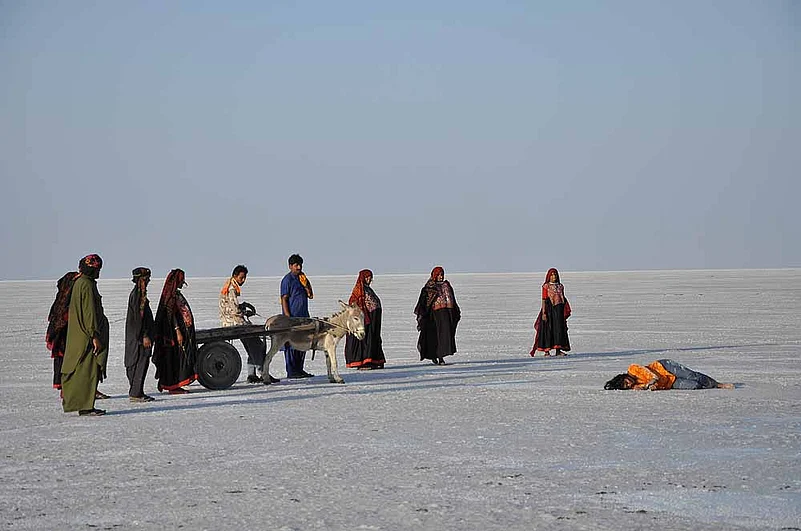An unending highway, sun blazing down and an infinite expanse of white sand. Three sets of stranded travellers search for their own individual paths against this imposing backdrop. The Shroff family, on a holiday to Athangasa, lose their young son, Adi. He ends up in the truck of Pappu who is on his way to an illegal deal. Then there’s little Poonam who strays into a brothel while travelling to her grandmother’s house. Gyan Correa’s debut Gujarati film, The Good Road, is an interesting idea on paper that fails to mount well on screen.
It’s somewhat like an Iranian film—slow, simple and spartan—just that there are no hidden depths or complexities here, only a few arresting moments. The mix of the real and the fablesque gets uneasy after awhile. The narrative moves in fits and spurts, many a sequence feels patently contrived, scenes too perfectly designed. And the acting, even by the professionals, is stilted, not to speak of the awkwardness of the amateur cast. It’s the rough and desolate Kutch landscape that lends the film its rootedness and character. The Good Road is a middling, innocuous film that may have just left the viewers feeling indifferent. However, its surprise selection as India’s foreign language Oscar entry, over the much touted The Lunchbox, put it in the veritable eye of the storm last week.
The latter’s supporters cite their film’s headstart—its popularity abroad, the backing of Sony Pictures Classic and of filmmakers Danis Tanovic and Michael Moore—as the incontrovertible reason why it should have been India’s chosen one. On the other side, The Good Road backers are appalled at the arrogance with which their film has been run down, without even been given a watch. If the poster boy of Indian independent cinema, Anurag Kashyap, a co-producer of The Lunchbox, has been taking flak for trying to knock down another indie (a regional one at that), his camp’s been alleging that jealousy and hatred directed against him was the reason for the backlash against their film.
And in the thick of this unseemly controversy, a few logical heads have also been wondering—what’s so great about the debatable Oscars anyways? Aren’t critical appreciation and popularity enough? Obviously not. Or else, would there have been sound and fury of such magnitude?
The one organisation happy with the result is the NFDC, having been associated with three films that were in the reckoning: Bhaag Milkha Bhaag, The Lunchbox and The Good Road. “It’s a diverse range. Our mandate is to promote cinemas of India and we have achieved that,” says GM Vikramjit Roy.
But debate on the films apart, the selection process is, yet again, under the scanner. Is it transparent, fair? This year, the composition of the jury itself was a secret with only chairman Gautam Ghosh facing the media till a resourceful blog revealed the 19 names online. Outlook tried to get in touch with a few but got no response. One member said he couldn’t speak. Actress Rupa Ganguly said that though she was invited to be on the jury she couldn’t attend the proceedings because of other commitments.
The moot question remains the same: what is our criterion for choosing a film? If it be quality, then why not Shabdo or The Ship of Theseus? What is the idea of India we want our films to represent at the Oscars? Is a surreal show of young prostitutes in tents (much like the Amsterdam display windows) more Indian than the dabbawalas of Mumbai? Is National Geographic-inspired images of Kutchi tribals more Indian than a man cutting vegetables on the local? “I don’t think we can stick to any narrow definitions of what constitutes Indian. The idea of representing India abroad is itself intrinsically problematic,” says Ganguly. “We need to break away from stereotypical images through which the West sees us...identify other aspects of Indianness,” says Shabdo actress Churni Ganguly.
Oscars is also ultimately a game that we need to play well. “This decision has to be taken seriously,” says Lunchbox star Irrfan. “A young generation of filmmakers wants to make films that travel and connect,” he says. “We mustn’t act as a deterrent to that.”
By Namrata Joshi with Dola Mitra






















